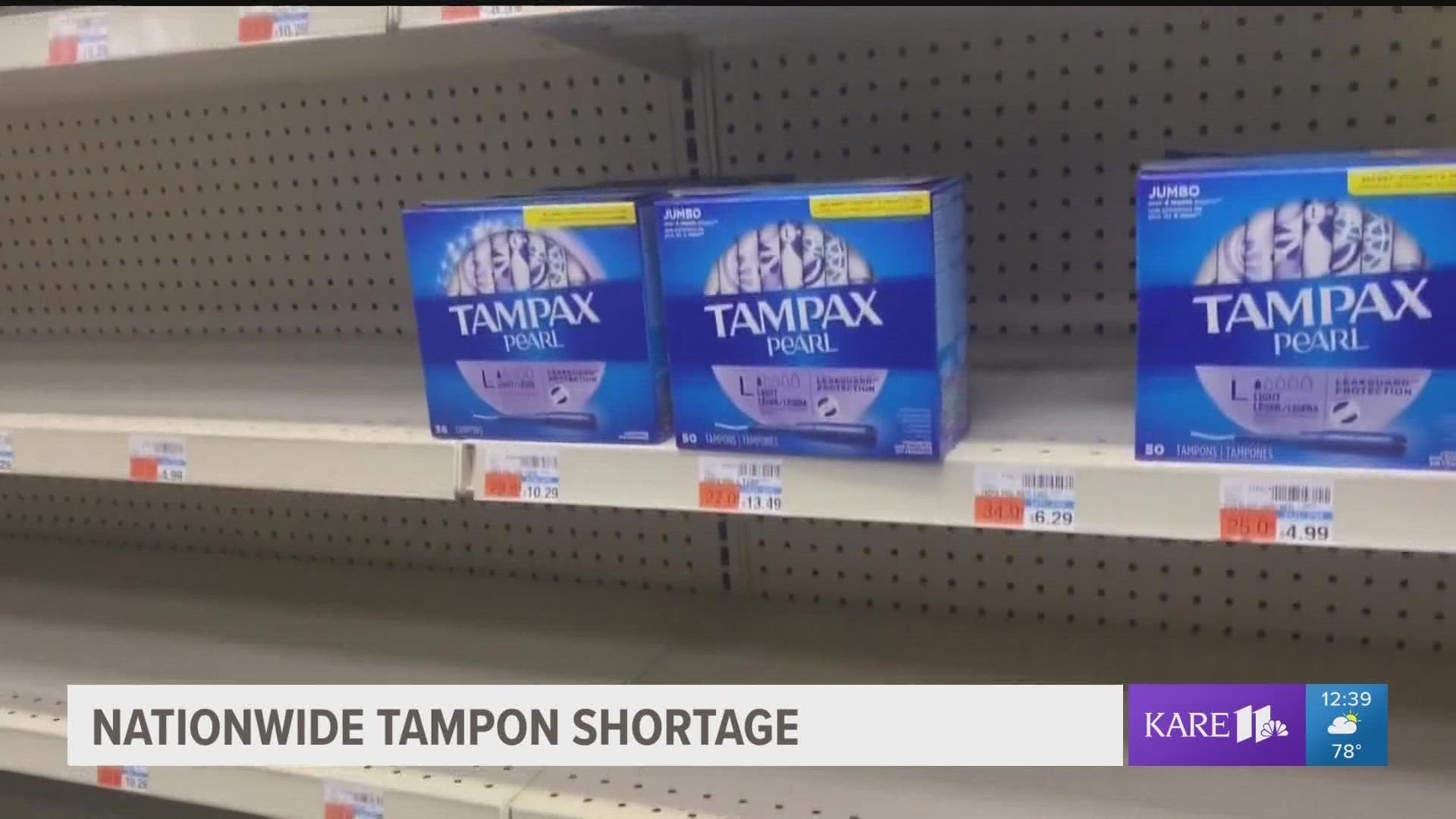MINNEAPOLIS — Inflation and supply chain woes are being blamed for driving up prices and driving down availability for products that millions of people use every month: tampons.
According to Bloomberg, the average price for a pack of menstrual pads rose 8.3% this year through May 28, while the price of tampons went up 9.8%.
Across the country, customers have reported seeing a shortage of tampons. In a Facebook post from June 14, the organization I Support the Girls shared photos of empty shelves in Washington, D.C., Denver and Kensington, Maryland.
"I wish this were a conversation that people were having more," said Dr. Rose Marie Leslie with Allina Health. "I think that we tend to avoid conversations around things like periods because it makes some people feel uncomfortable to talk about, but this is a really big deal."
On TikTok, Dr. Leslie has become a well-known source for relevant and relatable medical information. Her account, with a following of more than 900,000 people, has videos on topics from COVID-19 vaccines to vaping to reproductive health – even safety tips for getting eyelash extensions.
Talking about the public health effects of a tampon shortage, Dr. Leslie likened the issue to the recent baby formula shortage that left families across the country scrambling.
"I want to really emphasize that menstrual products are health care products. They're something that are absolutely necessary. They're not like a choice or something that's like just bought for fun," she said. "This is a needed health care product for half of the population [one week] per month."
In a statement to NBC News, Procter & Gamble, which makes both Tampax tampons and Always pads, acknowledged that some consumers may currently be unable "to find what they need" and called the current situation "temporary."
"The Tampax team is producing tampons 24/7 to meet the increased demand for our products," the company said. "We are working with our retail partners to maximize availability, which has significantly increased over the last several months."
A Walgreens spokesperson confirmed the pharmacy chain is currently dealing with a shortage, writing in a statement to KARE 11, "Walgreens works diligently with our suppliers to ensure we have supply available. However, similar to other retailers, we are experiencing some temporary brand-specific tampon shortages in certain geographies. While we will continue to have products at shelf and online, it may only be in specific brands while we navigate the supply disruption."
There are other menstrual products women can use instead of tampons, things like pads, menstrual cups or moisture-absorbing underwear. But making the switch isn't always the easy, preferred or best option.
Not finding the right size tampons can also pose problems.
"It's really important to have not only the size that fits you the best, but also to have different sizes if you need them, depending on how heavy your flow is," Dr. Leslie said.
So what can you do to avoid getting stuck without a tampon? If you're expecting your period, Dr. Leslie suggests buying tampons in advance instead of waiting until the moment you need them. You can buy online from a reputable site in the event your preferred products aren't on store shelves, but avoid buying from sites like eBay or other places where it's hard to verify what you're getting.
Also, don't use homemade tampons. Tampons are "made out of materials that are made for the vagina, rather than being made out of things that are potentially irritating for the vagina," Dr. Leslie explained.
Using things like toilet paper or sponges as a replacement for tampons can lead to bacteria growth and infections.
Finally, it's important to only wear tampons for the recommended amount of time, about 6-8 hours maximum, depending on your flow. Wearing a tampon for too long increases your risk for Toxic Shock Syndrome, a rare but life-threatening complication.
"I have talked with some people who have expressed a bit of concern about the fact that there aren't tampons that are available to them, or maybe the ones that they need aren't available, but it's not a conversation that I see [happening] as much on a broader scale," said Dr. Leslie. "And I think that problematic. We should be talking about it more because it really does impact people's health."
Watch more local news:
Watch the latest local news from the Twin Cities in our YouTube playlist:

